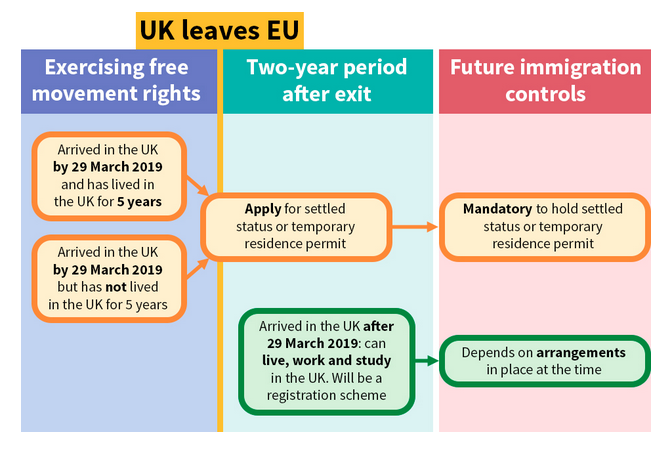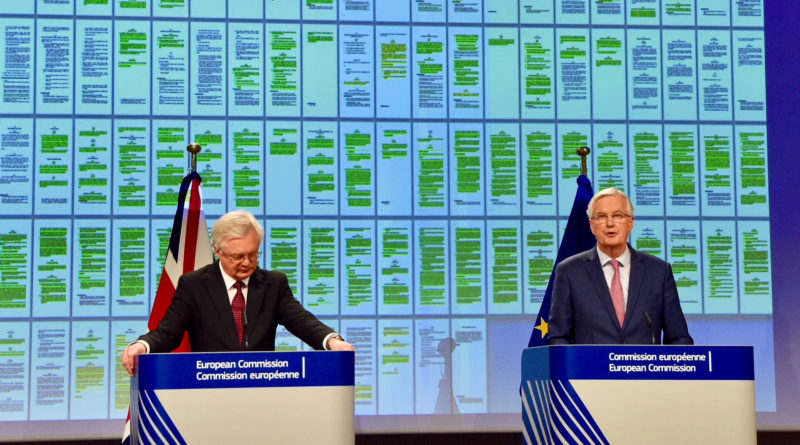Brexit negotiations on citizens’ rights are over (for now): here is the deal
Parts of the agreement on the UK withdrawal from the European Union were published on March 19 and were welcomed by EU countries’ leaders at the European Council meeting this week. These sections cover the rights of EU nationals living in the UK and British living in the rest of Europe, financial and institutional arrangements related to the UK departure, and the transition period after the official Brexit date of 29 March 2019. The text translates in legal language the political agreement reached in December, with some differences.
In the document, paragraphs on which negotiations are completed are highlighted in green. Yellow marks agreed policy objectives that require clarification, and white shows text proposed by the EU which is still under discussion or where there is no agreement. Most of the section on citizens’ rights is green and sources in Brussels have confirmed that negotiations on this issue are over. What does the agreement say?
People covered by the agreement
The agreement aims to confirm the rights included in the EU directive on free movement. It covers EU nationals legally resident in the UK and British in the rest of the EU, together with their family members or people in a durable relationship with them or other persons “whose presence is required” for them to enjoy the right of residence (e.g. carers), irrespective of their nationality.
Family reunions will be possible in the future, but only for relations existing by the end of the transition period. Both EU citizens in the UK and British returning to the UK from EU countries are therefore losing the automatic right to bring future foreign partners to the UK, as they will be subject to the more restrictive British immigration rules.
Children born or adopted after the UK withdrawal from the EU will be covered by the deal.
Reflecting the EU directive, the document says that economically inactive persons should prove that they have sufficient resources not to become a burden on the social assistance system of the country where they reside. “Comprehensive sickness insurance” is mentioned in this context. The UK, however, has committed to remove this requirement, which led to the rejection of a significant number of permanent residence applications in the past years, and Brussels believes the promise will be maintained.
In a new note on its website, the UK Home Office says:
In some circumstances, comprehensive sickness insurance is still required for the purposes of accessing the healthcare system in the UK, but will no longer be considered as a requirement for acquiring settled status.
The draft withdrawal agreement specifies that those who already have a permanent residence document will be able to exchange it with a new one free of charge. But they will be subject to a criminality and security check (this applies essentially to EU nationals in the UK). Expulsions should be based on ground of public or security threats, as it is now, although the number of EU citizens deported from the UK has soared since the EU referendum.
As a general rule, people will be able to leave the host country for up to five years without losing residence status.
Start of the registration
According to the withdrawal agreement, it will be possible to obtain the new residence status from the beginning of the transition period (after 29 March 2019). This clarifies a potential legal gap, as the British government was planning to introduce a voluntary registration system this year, while the country is still part of the EU and old rules are in place. However, the UK Home Office still expects “the online application form to go live in late 2018.”
If an application is refused before the end of the transition period, it will be possible to re-apply.
Considering that the UK will have to register 3 million people in a short period of time, the agreement specifies that in case of technical problems the deadline for applications will be extended automatically by one year.
Enforcement
People will be able to rely directly on the agreement and any provisions inconsistent or incompatible with it will be disapplied.
The European Court of Justice and the UK highest courts will stay in regular dialogue and a joint committee will be set up to supervise the application of the agreement and seek ways to prevent problems or resolve disputes. A special committee on citizens’ rights will also be established. White text in the document however signals that there is still no agreement on how to settle disputes or how to address non compliance.
The European Commission will monitor the application of the agreement in the EU27, while an independent authority will fulfill this role in the UK. This body will have the power to receive complaints from EU citizens living in the UK and their families, conduct inquiries on its own initiative and bring legal action before UK courts to seek remedy.
The joint committee supervising the implementation of the agreement will assess, no earlier than 8 years after the end of the transition period, the functioning of the national authority and decide whether to abolish it.
Future entries
Five years after the end of the transition period national identity cards may no longer be accepted to cross borders if they do not include a chip with biometric identification, according to the agreement.
Uncertainty continues
People covered by the deal will continue benefiting of current rights in terms of social security, aggregation of pensions, healthcare and recognition of qualifications acquired before the Brexit date. But there are still many unclear points.
For example, in which circumstances comprehensive sickness insurance will be required to access healthcare in the UK? Also, during the transition period (from 29 March 2019 to 31 December 2020), all EU rules should continue to apply and the withdrawal agreement says EU citizens moving to the UK or British citizens moving to the EU until the end of 2020 will also be covered by its provisions. EU Council president Donald Tusk said in its letter to EU leaders: “Our citizens crossing the Channel in this period will not get worse treatment than those who did so before.” The European parliament steering group on Brexit commented when the deal was announced: “We welcome confirmation that EU citizens coming to the UK will enjoy the same rights as those having arrived before the start of the transition period and that UK proposals advocating discrimination between EU citizens arrived before and after the start of the transition period have been rejected.”
But in its latest note, the UK Home Office website still differentiate between people who arrive before and after 29 March 2019, as the graph they published shows:

There are also questions about future family rights and controversy surrounds free movement rights of British nationals in the EU27. “In fact the agreement is as clear as mud when it comes to our future rights to move and work across the EU, either as people falling under the withdrawal agreement or as third country nationals,” said Jane Golding, chair of the British in Europe coalition. A paragraph saying that British nationals living in the EU will lose free movement rights as a result of the loss of EU citizenship has disappeared from the draft withdrawal agreement. But sources in Brussels say this remains implied and will be clarified in the guidelines that will accompany the final legal text.
Loss of rights
As things stand, both EU nationals living in the UK and British living in the rest of the EU are losing some of their rights, despite the declarations of politicians on both sides of the Channel.
British in Europe lose free movement rights and the recognition of professional qualifications beyond their host country or the country where they work, the right to return to the UK with non-UK spouses under the more favourable EU regime and the right to provide cross-border services as self-employed people. Jane Golding commented that the legal text provides more free movement rights “for English cheddar than to British citizens”.
A cross-party group of members of the European parliament wrote to the UK Brexit Secretary demanding clarifications on the rights of British citizens living in the EU.
Proud to co-sign a letter from MEPs to UK government on risks to Scots and Brits across the rest of the EU if Brexit happens. We will not allow their rights to be forgotten in this shambles. pic.twitter.com/WJSPLyMMff
— Alyn Smith MEP ????????? (@AlynSmith) March 20, 2018
As regards EU nationals in the UK, they lose the automatic right to bring to the UK future foreign spouses. Advocacy group the3million wrote to Donald Tusk complaining against statements that citizens’ rights have been “fully protected”. They say EU nationals in the UK will face “one of the harshest, most hostile and punitive immigration systems in Europe” with the risk of falling foul in a regime that has had so far a non-success rate of 30%.
Both groups also lose the life-long right to return to the country where they live, while their right to vote in local elections is left to the decision of each individual country.
“I feel sad and angry, especially for the younger generations of EU citizens in the UK and Brits in Europe. They will be the most affected of all: they won’t be able to enjoy the mobility they never thought was at risk and will be landlocked. Likewise, they won’t have the option to fall in love with a fellow European and build a family with them, because the UK and the EU could not find the resource to protect our current EU rights but curbed family reunification rights instead,” commented Nicolas Hatton, co-chair of the3million. “But Cheddar and Gouda will continue to cross the channels no doubt. It’s a sad day for the European project and a victory for the isolationists.”
Future trade agreement
Although this chapter seems now closed, some of the open questions will be discussed in the negotiation for the EU-UK trade agreement. The European parliament said that the future relationship “should include specific provisions concerning the movement of citizens from the EU to the UK and from the UK to the EU after the transition period”.
The guidelines for trade talks agreed by the European Council add:
The future partnership should include ambitious provisions on movement of natural persons, based on full reciprocity and non-discrimination among Member States, and related areas such as coordination of social security and recognition of professional qualifications. In this context, options for judicial cooperation in matrimonial, parental responsibility and other related matters could be explored, taking into account that the UK will be a third country outside Schengen and that such cooperation would require strong safeguards to ensure full respect of fundamental rights.
The European Council also reminded that agreement is still required on other issues, especially on the future border between Ireland and Northern Ireland, and “nothing is agreed until everything is agreed.”
Claudia Delpero © all rights reserved.
Photo: EU chief Brexit negotiator Michel Barnier and UK Brexit Secretary David Davis in Brussels, with the draft agreement in the background. © European Union, 2018, Source: EC – Audiovisual Service, photo by Mauro Bottaro.





